1895
Showing some results we found...Click here to view all

Original Period Civil War CDV of John S Mosby the Grey Ghost
Click here for more information
CollectionHero
Condition as seen. John Singleton Mosby (December 6, 1833 – May 30, 1916), also known by his nickname "Gray Ghost", was an American military officer who was a Confederate army cavalry battalion commander in the American Civil War. His command, the 43rd Battalion, Virginia Cavalry, known as Mosby's Rangers or Mosby's Raiders, was a partisan ranger unit noted for its lightning-quick raids and its ability to elude Union Army pursuers and disappear, blending in with local farmers and townsmen. The area of northern central Virginia in which Mosby operated with impunity became known as Mosby's Confederacy. After the war, Mosby became a Republican and worked as an attorney, supporting his former enemy's commander, U.S. President Ulysses S. Grant. He also served as the American consul to Hong Kong and in the U.S. Department of Justice.Early life and educationMosby was born in Powhatan County, Virginia, on December 6, 1833, to Virginia McLaurine Mosby and Alfred Daniel Mosby, a graduate of College. His father was a member of an old Virginia family of English origin whose ancestor, Richard Mosby, was born in England in 1600[2] and settled in Charles City, Virginia in the early 17th century. Mosby was named after his maternal grandfather, John Singleton, who was ethnically Irish.Mosby began his education at a school called Murrell's Shop (Elma, Nelson County). When his family moved to Albemarle County, Virginia (near in about 1840, John attended school in Fry's Woods before transferring to a Charlottesville school at the age of ten years. Because of his small stature and frail health, Mosby was the victim of bullies throughout his school career. Instead of becoming withdrawn and lacking in self confidence the boy responded by fighting back. The editor of his memoirs recounted a statement Mosby made that he never won any fight in which he was engaged. The only time he did not lose a fight was when an adult stepped in and broke it up.[3]In 1847, Mosby enrolled at College, where his father was an alumnus. Unable to keep up with his mathematics class,[4] Mosby left the college after two years. On October 3, 1850,[5][6][7] he entered the University of Virginia, taking Classical Studies and joining the Washington Literary Society and Debating Union. He was far above average in Latin, Greek, and literature (all of which he enjoyed), but mathematics was still a problem for him. In his third year, a quarrel erupted between Mosby and a notorious bully, George R. Turpin, a tavern keeper's son who was robust and physically impressive. When Mosby heard from a friend that Turpin had insulted him, Mosby sent Turpin a letter asking for an of the rituals in the code of honor to which Southern gentlemen adhered. Turpin became enraged and declared that on their next meeting, he would "eat him up raw!" Mosby decided he had to meet Turpin despite the risk; to run away would be dishonorable [8]On March 29 the two met, Mosby having brought with him a small pepper-box pistol in the hope of dissuading Turpin from an attack. When the two met and Mosby said, "I hear you have been making assertions ..." Turpin put his head down and charged. At that point, Mosby pulled out the pistol and shot his adversary in the neck. The distraught 19-year-old Mosby went home to await his fate. He was arrested and arraigned on two charges: unlawful shooting (a misdemeanor with a maximum sentence of one year in jail and a $500 fine) and malicious shooting (a felony with a maximum sentence of 10 years in the penitentiary). After a trial that almost resulted in a hung jury, Mosby was convicted of the lesser offense, but received the maximum sentence. Mosby later discovered that he had been expelled from the university before he was brought to trial.[9]While serving time, Mosby won the friendship of his prosecutor, attorney William J. Robertson. When Mosby expressed his desire to study law, Robertson offered the use of his law library. Mosby studied law for the rest of his incarceration. Friends and family used political influence in an attempt to obtain a pardon. Gov. Joseph Johnson reviewed the evidence and pardoned Mosby on December 23, 1853, as a Christmas present, and the state legislature rescinded the $500 (~$17,588 in 2022) fine at its next session [10][11] The incident, trial, and imprisonment so traumatized Mosby that he never wrote about it in his memoirs [12]After studying for months in Robertson's law office, Mosby was admitted to the bar and established his own practice in nearby Howardsville Family lifeAbout this time, Mosby met Pauline Clarke (March 30, 1837 – May 10, 1876), who was visiting from Kentucky. Although he was Protestant (nominally Methodist or agnostic) and she was Catholic, courtship ensued. Her father was Beverly L. Clarke.[13] They were married in a Nashville hotel on December 30, 1857. After living for a year with Mosby's parents, the couple settled in Bristol, Virginia, which was near a road connecting into Tennessee and Kentucky over the Cumberland Gap.The Mosbys had two children before the Civil War (May and Beverley).[14] John Singleton Mosby Jr., who like his father became a lawyer, and later worked for mining companies in the west, was born in 1863 during the war. By 1870, the family included five children (adding Lincoln Mosby, 1865–1923, and Victoria Stuart Mosby Coleman, 1866–1946), and lived in Warrenton, Virginia. The Catholic Church established a mission in Warrenton by 1874, which is now known as St. John the Evangelist Catholic Church.[15] Mosby was dedicated to his family and paid to have them educated at the best Catholic schools in Washington, D.C., when he moved there after his wife's death in 1876. Their sons served as altar boys and Mosby's youngest sister, Florie, not only converted to Catholicism, but became a Catholic nun.[16] Two more daughters also survived their parents, Pauline V. Mosby (1869–1951) and Ada B. Mosby (1871–1937), but the Mosbys also lost two sons in the turbulent aftermath of the Panic of 1873, George Prentiss Mosby (1873–1874) and Alfred McLaurine Mosby (1876–1876) Civil War careerMosby during the American Civil War1861Mosby spoke out against secession, but joined the Confederate army as a private at the outbreak of the war. He first served in William "Grumble" Jones's Washington Mounted Rifles. Jones became a Major and was instructed to form a more collective "Virginia Volunteers", which he created with two mounted companies and eight companies of infantry and riflemen, including the Washington Mounted Rifles. Mosby thought the Virginia Volunteers lacked congeniality, and he wrote to the governor requesting to be transferred. However, his request was not granted. The Virginia Volunteers participated in the First Battle of Bull Run (First Manassas) in July 1861.1862John Singleton MosbyIn April 1862, the Confederate Congress passed the Partisan Ranger Act which "provides that such partisan rangers, after being regularly received into service, shall be entitled to the same pay, rations, and quarters, during their term of service, and be subject to the same regulations, as other soldiers."By June 1862, Mosby was scouting for J.E.B. Stuart during the Peninsular Campaign, including supporting Stuart's "Ride around McClellan".[17] He was captured on July 20 by Union cavalry while waiting for a train at the Beaverdam Depot in Hanover County, Virginia. Mosby was imprisoned in the Old Capitol Prison in Washington, D.C., for ten days before being exchanged as part of the war's first prisoner exchange. Even as a prisoner Mosby spied on his enemy. During a brief stopover at Fort Monroe he detected an unusual buildup of shipping in Hampton Roads and learned they were carrying thousands of troops under Ambrose Burnside from North Carolina on their way to reinforce John Pope in the Northern Virginia Campaign. When he was released, Mosby walked to the army headquarters outside Richmond and personally related his findings to Robert E. Lee.[18]After the Battle of Fredericksburg, in December 1862, Mosby and his senior officer J.E.B. Stuart led raids behind Union lines in Prince William, Fairfax and Loudoun counties, seeking to disrupt federal communications and supplies between Washington, D.C., and Fredericksburg, as well as provision their own forces. As the year ended, at Oakham Farm in Loudoun County, Virginia Mosby gathered with various horsemen from Middleburg, Virginia who decided to form what became known as Mosby's Rangers [19]1863Mosby s Rangers-Top row (left to right): Lee Herverson, Ben Palmer, John Puryear, Tom Booker, Norman Randolph, Frank Raham.# Second row: Robert Blanks Parrott, John Troop, John W. Munson, John S. Mosby, Newell, Neely, Quarles.# Third row: Walter Gosden, Harry T. Sinnott, Butler, Gentry.Edwin H. Stoughton.In January 1863, Stuart, with Lee's concurrence, authorized Mosby to form and take command of the 43rd Battalion Virginia Cavalry. This was later expanded into Mosby's Command, a regimental sized unit of partisan rangers operating in Northern Virginia. The 43rd Battalion operated officially as a unit of the Army of Northern Virginia, subject to the commands of Lee and Stuart, but its men (1,900 of whom served from January 1863 through April 1865) lived outside of the norms of regular army cavalrymen. The Confederate government certified special rules to govern the conduct of partisan rangers. These included sharing in the disposition of spoils of war. They had no camp duties and lived scattered among the civilian population. Mosby required proof from any volunteer that he had not deserted from the regular service, and only about 10% of his men had served previously in the Confederate Army.[20]In March 1863, Mosby conducted a daring raid far inside Union lines near the Fairfax County courthouse. He was helped, according to his own account, by a deserter from the 5th New York Cavalry regiment named James Ames, who served under Mosby until he was killed in 1864.[21][22] He and his men captured three Union officers, including Brig. Gen. Edwin H. Stoughton. Mosby wrote in his memoirs that he found Stoughton in bed and roused him with a "spank on his bare back."[23][24] Upon being so rudely awakened the general indignantly asked what this meant. Mosby quickly asked if he had ever heard of "Mosby". The general replied, "Yes, have you caught him?" "I am Mosby," the Confederate ranger said. "Stuart's cavalry has possession of the Court House; be quick and dress." Mosby and his 29 men had captured a Union general, two captains, 30 enlisted men, and 58 horses without firing a shot.[25][26] Mosby was formally promoted to the rank of captain two days later, on March 15, 1863, and major on March 26, 1863.[27]On May 3, 1863, Mosby attacked and captured supply depot Warrenton Junction, Virginia guarded by about 80 men of the 1st West Virginia Volunteer Cavalry Regiment; Mosby's losses were 1 killed and 20 wounded/and or captured; Union losses were 6 officers and 14 privates killed and wounded.[28] On May 29, 1863, Mosby with 40 men [29] led a raid in Greenwich, Virginia derailing a supply train; a battle occurred between Mosby's forces and the Union Cavalry under Colonel Mann who commanded the 1st Vermont Cavalry; 5th New York Cavalry; 7th Michigan Cavalry; Mosby was obliged to retreat losing 6 killed; 20 wounded and 10 men and 1 howitzer captured; Union losses were 4 killed and 15 wounded.[30] On June 10, 1863, Mosby led 100 men on a raid across the Potomac River to attack the Union camp at Seneca, Maryland. After routing a company of the Sixth Michigan Cavalry and burning their camp, Mosby reported the success to J.E.B. Stuart. This drew Stuart's attention to Rowser's Ford. Mosby had crossed the Potomac there, and during the night of June 27 Stuart's forces would use the same crossing while separated from Lee's army, and thus didn't arrive at Gettysburg until the afternoon of the second day of the battle. Thus, some analysts claim Lee stumbled into the battle without his cavalry, partly because of Mosby's successful skirmish at Seneca three weeks earlier [31]Mosby endured his first serious wound of the war on August 24, 1863, during a skirmish near Annandale, Virginia, when a bullet hit him through his thigh and side. He retired from the field with his troops and returned to action a month later [32]1864The partisan rangers proved controversial among Confederate army regulars, who thought they encouraged desertion as well as morale problems in the countryside as potential soldiers would favor sleeping in their own (or friendly) beds and capturing booty to the hardships and privations of traditional military campaigns. Mosby was thus enrolled in the Provisional Army of the Confederate States and soon promoted to lieutenant colonel on January 21, 1864, and to colonel, December 7, 1864.[27] Mosby carefully screened potential recruits, and required each to bring his own horse.The Personal Memoirs of Ulysses S. Grant tell of an incident near Warrenton, Virginia on about May 1, 1864, when Mosby unknowingly missed by only a few minutes a chance to kill or capture Grant, who was traveling unguarded on a special train from Washington back to his headquarters to launch the Overland Campaign.Mosby endured a second serious wound on September 14, 1864, while taunting a Union regiment by riding back and forth in front of it. A Union bullet shattered the handle of his revolver before entering his groin. Barely staying on his horse to make his escape, he resorted to crutches during a quick recovery and returned to command three weeks later [33]Mosby s successful disruption of supply lines, attrition of Union couriers, and disappearance in the disguise of civilians caused Lt. Gen. Ulysses S. Grant to tell Maj. Gen. Philip Sheridan:The families of most of Mosby's men are know[n] and can be collected. I think they should be taken and kept at Fort McHenry or some secure place as hostages for good conduct of Mosby and his men. When any of them are caught with nothing to designate what they are hang them without trial.[34]On September 22, 1864, Union forces executed six of Mosby's men who had been captured out of uniform (i.e. as spies) in Front Royal, Virginia; a seventh (captured, according to Mosby's subsequent letter to Sheridan, "by a Colonel Powell on a plundering expedition into Rappahannock") was reported by Mosby to have suffered a similar fate.[35] William Thomas Overby was one of the men selected for execution on the hill in Front Royal. His captors offered to spare him if he would reveal Mosby's location, but he refused. According to reports at the time, his last words were, "My last moments are sweetened by the reflection that for every man you murder this day Mosby will take a tenfold vengeance."[36] After the executions a Union soldier pinned a piece of paper to one of the bodies that read: "This shall be the fate of all Mosby's men [37]Captain Montjoy, wood engraving 1867[38]After informing General Robert E. Lee and Confederate Secretary of War James A. Seddon of his intention to respond in kind, Mosby ordered seven Union prisoners, chosen by lot, to be executed in retaliation on November 6, 1864, at Rectortown, Virginia. Although seven men were duly chosen in the original "death lottery," in the end just three men were actually executed. One numbered lot fell to a drummer boy who was excused because of his age, and Mosby's men held a second drawing for a man to take his place. Then, on the way to the place of execution a prisoner recognized Masonic regalia on the uniform of Confederate Captain Montjoy, a recently inducted Freemason then returning from a raid. The condemned captive gave him a secret Masonic distress signal. Captain Montjoy substituted one of his own prisoners for his fellow Mason[39] (though one source speaks of two Masons being substituted) [40] Mosby upbraided Montjoy, stating that his command was "not a Masonic lodge". The soldiers charged with carrying out the executions of the revised group of seven successfully hanged three men. They shot two more in the head and left them for dead (remarkably, both survived). The other two condemned men managed to escape separately [41]On November 11, 1864, Mosby wrote to Philip Sheridan, the commander of Union forces in the Shenandoah Valley, requesting that both sides resume treating prisoners with humanity. He pointed out that he and his men had captured and returned far more of Sheridan's men than they had lost.[42] The Union side complied. With both camps treating prisoners as "prisoners of war" for the duration, there were no more executions.On November 18, 1864, Mosby's command defeated Blazer's Scouts at the Battle of Kabletown [43]Mosby had his closest brush with death on December 21, 1864, near Rector's Crossroads in Virginia. While dining with a local family, Mosby was fired on through a window, and the ball entered his abdomen two inches below the navel.[32] He managed to stagger into the bedroom and hide his coat, which had his only insignia of rank. The commander of the Union detachment, Maj. Douglas Frazar of the 13th New York Cavalry, entered the house and—not knowing Mosby's the wound and pronounced it mortal. Although left for dead, Mosby recovered and returned to the war effort once again two months later [44]1865Several weeks after General Robert E. Lee's surrender, Mosby's status was uncertain, as some posters above the signature of Gen. Winfield S. Hancock stated that marauding bands would be destroyed, and specifically named Mosby as a guerrilla chief who was not included in the parole. However, Mosby received a copy of the poster on April 12 at a letter drop in the Valley along with a letter from Hancock's chief of staff, Gen. C.H. Morgan, calling on Mosby to surrender and promising the same terms as were extended to General Lee. Further negotiations followed at Winchester and Millwood. Finally, on April 21, 1865, in Salem, Virginia, Mosby disbanded the rangers, and on the following day many former rangers rode their worst horses to Winchester to surrender, receive paroles and return to their homes [45]Rather than following his men to Winchester, Mosby instead rode south with several officers, planning to fight on with General Joseph E. Johnston's army in North Carolina. However, before he reached his fellow Confederates, he read a newspaper article about Johnston's surrender. Some proposed that they return to Richmond and capture the Union officers who were occupying the White House of the Confederacy, but Mosby rejected the plan, telling them, "Too late! It would be murder and highway robbery now. We are soldiers, not highwaymen [46] By early May, Mosby confirmed the $5,000 bounty on his head, but still managed to evade capture, including at a raid near Lynchburg, Virginia which terrified his mother. When Mosby finally confirmed the arrest order had been rescinded, he surrendered on June 17, one of the last Confederate officers to do so [47][48]Later legal careerWhen the Civil War ended, Mosby was just 31, and would live another five decades. He resumed his law practice in Warrenton, and by December 1865 was prosecuting the internal revenue collector in Prince William County for mule-stealing. Nonetheless, during the year after receiving his parole, Mosby often found himself harassed by occupying Union forces, arrested on petty or trumped-up charges, until his wife and young son Revardy, after being rebuffed by President Andrew Johnson despite their mutual kinship ties, met General Grant in January 1866 and secured a handwritten exemption from arrest and guarantee of safe conduct [49][50]Mosby s former residence at Washington, D.C.'s Logan Circle in August 2008.Virginia politicsOn May 8, 1872, as covered by the Washington Star, Mosby personally thanked then-U.S. President Ulysses S. Grant for that document. Mosby also told Grant he believed vehemently that election of Horace Greeley (a long-time editor of the New York Tribune detested in the South) would be worse for the South because the men surrounding him were worse than those surrounding his old benefactor Grant. A few days later, Massachusetts Congressman Benjamin Butler presented an amnesty bill for former Confederates, as Mosby had suggested in that meeting, and soon President Grant signed it into law. After Greeley became the Democratic party's nominee in July, Mosby became Grant's campaign manager in Virginia, and an active Republican, although he also made sure the Republicans would not run a candidate against his friend and fellow Warrenton attorney Eppa Hunton, who campaigned and won as a Democrat.[51] In his autobiography Grant stated, "Since the close of the war, I have come to know Colonel Mosby personally and somewhat intimately. He is a different man entirely from what I supposed. ... He is able and thoroughly honest and truthful [52]Soon Mosby had become one of Grant's favorites and was bringing federal patronage jobs to local Virginians, although initially he did not hold any federal job. He tried to make a rapprochement between President Grant and Virginia Governor James L. Kemper, a Confederate Major General and Conservative elected the following year and whom Mosby also supported. However, that failed. His Republican political activity diminished Mosby's popularity in Warrenton; many considered him a turncoat. Many Southerners still considered Grant "the enemy". Mosby received death threats, his boyhood home was burned down, and at least one attempt was made to assassinate him. Later reflecting on the animosity shown to him by his fellow Virginians, Mosby stated in a May 1907 letter that "There was more vindictiveness shown to me by the Virginia people for my voting for Grant than the North showed to me for fighting four years against him."[53]After the deaths of his wife Pauline and infant son Alfred in mid-1876, Mosby decided to move his family to Washington, D.C., but had difficulty finding enough legal business to support them. He thus spent much time campaigning for the Republican candidate, Rutherford B. Hayes. Scandals had rocked the Grant Administration as it ended, but Hayes became the next President, and Mosby hoped for a patronage appointment. He also courted powerful Ohio Congressman James Garfield, telling him his desire for a government position, preferably in the Justice Department. He was instead offered a position as trade representative to Canton, but ultimately was confirmed by the Senate as United States consul to Hong Kong (a position he held from 1878 to 1885).[54]Mosby had to leave his children in the care of relatives, but this proved to be the first in a series of other federal government jobs and postings, many fighting rampant fraud in politically volatile situations. President McKinley appointed Mosby's daughter May the postmistress in Warrenton, which became very important after her husband Robert Campbell died in August 1889, leaving her to raise her young children alone (although her sons John Mosby Campbell and Alexander Spottswood Campbell received many letters and some money from their overseas grandfather, as to a lesser extent did Jack Russell, son of his late sister Lucie) [55]Consul in Hong KongUpon arriving in Hong Kong, Mosby found discrepancies in his predecessor's recordkeeping, and believed David H. Bailey had colluded with his vice-consul Loring (whom Mosby fired), to bilk the government of thousands of dollars in fees. Bailey had pocketed fees charged Chinese emigrants sailing to the U.S. on foreign-flag ships (certifying that they emigrated voluntarily and were not part of notorious "coolie traffic"), and claimed "expenses" for shipboard examinations (by the illiterate proprietor of a local boardinghouse frequented by sailors) of those emigrating on U.S.-flag ships equal to the fees charged. Mosby thought Bailey had almost doubled his salary over the previous eight years by embezzlement and kickbacks, and stopped charging for shipboard examinations (which he personally conducted) [56]However Bailey had recently been nominated to become consul at Shanghai because George Seward, previous consul since 1863, had been nominated to become the ambassador to China. Seward's replacement in Shanghai, John C. Myers of Reading, Pennsylvania, had reported to State Department superiors that George Seward and his vice-consul Oliver Bradford had been engaging in land and capital speculation in China that seemed to violate the Burlingame Treaty of 1868, but had been suspended, as had his successor Wiley Wells, ex-Congressman from Mississippi. Wells and Myers then sought redress from Congress, which was considering impeaching George Seward, but Bailey traveled to Washington to defend his crony [57]Mosby s initial letter to his superior (Frederick W. Seward, son of the former secretary of state and who had been wounded by Mosby's ex-subordinate while defending his father from an assassination attempt on the night of President Lincoln's assassination) languished. However, Special Treasury Department Inspector DeB. Randolph Keim made a whirlwind inspection of Far East consulates and found many similar bookkeeping irregularities. Eventually, in March 1879, Mosby wrote to General Thomas C. H. Smith, a friend of President Hayes, about a similar embezzlement scheme operated by David B. Sickels (U.S. Consul at Bangkok) and his vice-consul Torrey (a Hong Kong native whose correspondence to the fired Loring Mosby accepted and read). Mosby also learned that Bailey had charged (and pocketed) $10,000 per year for shipments of opium to the United States from Macao, although Mosby proposed to issue the required certificate for the legal export for just $2 50 [58]Meanwhile consul Mosby was occupied entertaining his old friend President Grant, who spent the two years after his retirement touring the world as a semi-private citizen. Mosby received Grant on April 30. During the nearly week-long visit, Grant told Mosby he had heard more reports about the problems in Bangkok and advised Mosby to go directly to President Hayes (as Mosby had just done) and promised to talk to Hayes personally. However, Bailey was confirmed as consul in Shanghai before Grant's return home, and newspapers had begun publishing stories about Mosby's inappropriate attire, the start of a campaign to minimize him as a "crackpot." Moreover, the new State Department investigator was General Julius Stahel, who had fought Mosby in Virginia and had been consul at Hyogo, Japan Nonetheless Stahel verified Mosby's complaints, and former Union Cavalry Major William H. Forbes (who had once stabbed Col. Mosby's coat during an engagement) who now headed Russell and Co. (major traders in the Far East, including of opium) also supported Mosby against Bailey, Seward and their newspaper friends. Alexander McClure of the Philadelphia Times agitated to clean up the consular service. Fred Seward, amidst charges that he was shielding the rascals, resigned by October 1879, and was replaced by John Hay. By January 1880, Grant and journalist John R. Young (who would become consul at Shanghai two years later) briefed Secretary of State William M. Evarts about Sickels and Torrey.[59] George Seward resigned well before the 1880 election, followed by Bailey and Sickels as the President "at last swept the China coast [60]Nonetheless Mosby was unhappy, despite the electoral victory of his friend Garfield in November and his son Beverley joining him as vice-consul. His repeated requests for leave to return home and visit the rest of his family kept being denied, as were most requests for supplies or funds, and one relative was removed from the Lighthouse Board. In addition to the press and bureaucratic sniping, Mosby found his salary insufficient to support socialization among the local merchant class. Still, as 1880 began, Mosby won a slander lawsuit brought against him in Hong Kong by Peter Smith, the sailors' boardinghouse keeper associated with ex-consul Bailey, reporting that he defended himself to the applause of jury and spectators, as well as laughter of the distinguished judge.[61] By the time Mosby received notice that his U.S. leave had been approved, President Garfield had been shot and was hanging on to life. Garfield died on September 20, and President Chester Arthur considered promoting Mosby to the similar post at Shanghai (with higher living expenses), but Mosby wanted to either return home or remain in Hong Kong. Thus he remained in exile and dealt with the implications of the Chinese Exclusion Act, the growing opium trade and the brewing war between France and China.[62]Mosby left China after the election of Democrat Grover Cleveland led to a change in administrations He was replaced by fellow Virginian Robert E. Withers, whom Mosby had long despised [63]Railroad lawyerBefore leaving China, Mosby had written Grant seeking help in finding another position. Grant responded (as he was dying) with a letter recommending Mosby to Senator Leland Stanford, a former California railroad magnate. Mosby then spent about 16 years in California, working as a lawyer for the Southern Pacific Railroad until the death of his mentor Collis Huntington. Much of what he did remains unknown, due to a fire which destroyed the company's records of that era. Although Mosby hated the desk work, he twice returned to Washington, D.C., to argue before the United States Supreme Court—once based on the consul fees he had remitted to the Treasury (and which the claims court found him entitled to) and once for the railroad. Mosby also wrote articles for Eastern newspapers about his escapades during the Civil War, and traveled to New England on a speaking tour where he met Oliver Wendell Holmes Jr. & Sr. (father and son).[64] He also befriended the Patton family and spent time at their ranch with their young son, George S. Patton, recreating Civil War battles, with Mosby playing himself and George playing Robert E. Lee.[65]In 1898, Mosby tried to secure an officer's commission, for the War, but was blocked by Secretary of War Russell A. Alger (see: Russell A. Alger § Vendetta against John S. Mosby). Mosby trained an Oakland, California cavalry troop, dubbed Mosby’s Hussars, but the War ended, and they never left for Cuba or the Philippines [66]Government attorneyWhen Mosby returned to Washington in 1901, during the second term of the McKinley administration (wary during the first term because of McKinley's service in the Shenandoah Valley during the Civil War, as well as being perceived as just another office-seeker), he again sought a job in the Justice Department. After McKinley's assassination, President Theodore Roosevelt instead sent Mosby west as a special agent of the Department of the Interior. There, Mosby dealt with illegal fencing of range land by cattle barons in Colorado and Nebraska, who often used fake homestead claims by military widows as well as violated the Van Wyck Fence Law of 1885. When witnesses refused to come forward to testify about illegal fencing for fear of retaliation, Mosby upheld the law by first sending notices to the affected landowner. The Pawnee Cattle Company capitulated in Colorado, so Mosby moved on to western Nebraska, where he learned the land agent actually lived in Iowa and failed to supervise the range [67]Mosby s Colorado methods failed, however, since the Omaha grand jury refused to authorize an indictment against Bartlett Richards or anyone but nonresident agent W.R. Lesser. Mosby was recalled to Washington to appease Nebraska's Senators, and then sent to halt timber trespassers in Alabama forests. However, other attorneys were sent out, who secured indictments. Richards and his English brother in law William G. Comstock were convicted in 1905 despite their argument that the government land hadn't been surveyed. The local judge sentenced them to $300 fine apiece and six hours in custody, which they spent celebrating at the Omaha Cattlemen's Club, and which led President Roosevelt to fire both the U.S. attorney and U.S. Marshal. The next year Richards and Comstock were indicted on a new charge of conspiracy to deprive the government of public land, convicted and fined $1,500 fines as well as sentenced to a year in jail. After three years of appeals, the convictions and sentences were upheld, so they were sent to prison in Hastings, Nebraska for a year beginning in 1901, and Richards died in a hospital a month before the sentence would end [68][69]Mosby finally got the Department of Justice post he wanted as Philander Knox ended his term as attorney general. It was not with the trust-busting unit, however, but with the Bureau of Insular and Territorial affairs, where Mosby worked (at a low salary of $2,400/year) under his brother-in-law Charles W. Russell Jr. from 1904 to 1910.[70] In 1905 President Roosevelt again sent him to Alabama to troubleshoot allegations of irregularities at the Port of Mobile. Next, he was sent to Oklahoma to investigate charges against U.S. Marshal (and former Rough Rider) Benjamin Colbert. He also secured an indictment of McAlester attorneys George Mansfield, John F. McMurray and Melvin Cornish for of Indian Trust funds, but his superior Russell thought the evidence insufficient and ultimately dropped the charges two years later. Meanwhile, Mosby went back to investigate charges of land frauds against Indian minors, and on his return found little to do [71]Memoirist of the Civil WarMosby was forced to retire from his Justice Department post at age 76, under the William Howard Taft administration. Blind in one eye and cantankerous, he spent his final years in Washington, D.C., living in a boardinghouse and watched over by his remaining daughters to the extent he would let them or others.Mosby and his former lieutenant, John S. RussellMosby also continued writing about his wartime exploits, as he had been in 1887 Mosby's War Reminiscences and Stuart's Cavalry Campaigns, which had defended the reputation of J.E.B. Stuart, who some partisans of the "Lost Cause" blamed for the Confederacy's defeat at the Battle of Gettysburg. Mosby had served under Stuart and was fiercely loyal to the late general, writing, "He made me all that I was in the war. ... But for his friendship I would never have been heard of." He lectured in New England in connection with that first book and wrote numerous articles for popular publications. He published a book length treatise in 1908, a work that relied on his skills as a lawyer to refute categorically all of the claims laid against Stuart. A recent comprehensive study of the Stuart controversy, written by Eric J. Wittenberg and J. David Petruzzi, called Mosby's work a "tour de force".[72]He attended only one reunion of his Rangers, in Alexandria, Virginia, in January 1895, noticing with bemusement how many had become clergymen but preferring to look forward not back.[73] During the war, he had kept a slave, Aaron Burton, to whom he occasionally sent money in Brooklyn, New York after the war and with whom he kept in contact into the 1890s.[74] In 1894, Mosby wrote to a former comrade regarding the cause of the war, stating: "I've always understood that we went to war on account of the thing we quarreled with the North about. I've never heard of any other cause than slavery [75][76][77]In June 1907, Mosby wrote a letter to Samuel "Sam" Chapman, in which he expressed his displeasure over people, namely George Christian, downplaying and denying the importance of slavery in its causing the American Civil War. In the letter, Mosby explained his reasons as to why he fought for the Confederacy, despite personally disapproving of slavery. Although he admitted that the Confederate states had seceded to protect and defend their institution of slavery, he had felt it was his patriotic duty as a Virginian to fight on behalf of the Confederacy, stating that, "I am not ashamed of having fought on the side of slavery—a soldier fights for his country—right or wrong—he is not responsible for the political merits of the course he fights in" and that, "The South was my country [78][79]Death and legacyIn January 1915 the University of Virginia awarded Mosby a medal and written tribute, which touched him deeply. Throughout his life, Mosby remained loyal to those he believed fair-minded, such as Stuart and Grant, but refused to cater to Southern sympathies. He proclaimed that there was "no man in the Confederate Army who had less of the spirit of knight-errantry in him, or took a more practical view of war than I did."[77] He died of complications after throat surgery in a Washington, D.C., hospital on May 30, 1916, noting at the end that it was Memorial Day. He is buried at the Warrenton Cemetery in Warrenton, Virginia [27]Mosby s grave in Warrenton, Virginia"War Loses Its Romance": Inscription of military quotation by John S. Mosby at Veterans Memorial at the Lackawanna County Courthouse in Scranton, PennsylvaniaThe area around Middleburg, from where Mosby launched most of his behind the lines activities, was called "Mosby's Confederacy", even in the Northern press. The Virginia Piedmont Heritage Area Association, formerly called the Mosby Heritage Area Association and headquartered in Middleburg, is actively involved in preserving the history, culture, and scenery of this historic area.[80]The John Singleton Mosby Museum was located in Warrenton, Virginia, at the historic Brentmoor estate where Mosby lived from 1875 to 1877. After it closed many of the artifacts moved to the Old Fauquier County Jail museum.There are 35 monuments and markers in Northern Virginia dedicated to actions and events related to Mosby's Rangers [81]John Mosby Highway, a section of US Route 50 between Dulles Airport and Winchester, Virginia, is named for Colonel Mosby.[82]Mosby Woods Elementary School in the Fairfax County Public Schools system was originally named in his honor.[83] The name of the school was changed to Mosaic Elementary School by the Fairfax County School Board in February 2021; effective at the start the 2021–2022 academic year.[84]The segregation academy John S. Mosby Academy operated in Front Royal, Virginia from 1959 to 1969.Mosby Woods subdivision in Fairfax City is also named in his honor.The Mosby Woods Pool, located in the Mosby Woods subdivision, is named in his honor as is its swim team, the Mosby Woods Raiders, who compete in the Northern Virginia Swim League.The post office branch for zip code 22042 (in Northern Virginia's Falls Church area) is referred to by the USPS as the Mosby branch.Mosby Court, located in the Hillwood Estates subdivision of Round Hill, Virginia, remains named in his honor after residents there, in 2022, rejected Loudoun County's proposal to rename the cul-de-sac along with several other streets in the neighborhood (Early Avenue, Hampton Road, Jackson Avenue, Lee Drive, Longstreet Avenue, and Pickett Road) that were named or renamed after Confederate generals in the early 1960s.[85]The World War II Liberty Ship SS John S. Mosby was named in his honor.The John S. Mosby Army Reserve Center located on Fort Belvoir, VA is named in his honor. (Condition: Pre-Owned)
from CollectionHero
CollectionHero
1750.00
USD
2025-11-20
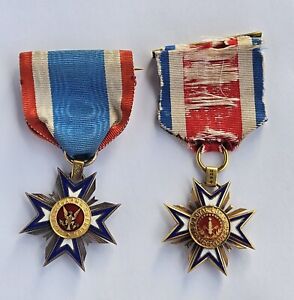
New ListingCivil War Mollus Military Order Of The Loyal Legion Medal 210th PA Father/Son
Click here for more information
CollectionHero
eBay Two nice Mollus medals to a father and his son. One belonged to Cyrus Townsend who was wia at Gettysburg with the 140th PA fighting around the Wheatfield. Born May 7th 1838 in Meadville Pennsylvania, died August 4th 1898 in Leavenworth Kansas. Entered the service as private, 140th Pennsylvania Infantry August 22nd 1862. Quartermaster Sergeant July 13th 1863, discharged to accept commission October 17th 1864. First Lieutenant and Regimental Quartermaster 211th Pennsylvania infantry October 18th 1864. Honorably mustered out June 2nd 1865. With the regiment as private soldier guarding public property in Maryland from August to December 1862; in Burnside's Mud Campaign 1863; at and Gettysburg as Quartermaster Sergeant through the Wilderness and Richmond campaign under General Grant until October 17th 1864, date of discharge to accept commission. During final campaign around Petersburg assigned to duty on staff of commanding General Hartranft who commanded 3rd Division IX Corps in charge of ammunition supplies and was present in final assault and capture of Petersburg. After capture of Petersburg he was assigned to the staff of General Matthews commander 3rd Brigade 3rd Division 9th Corps as acting Assistant Quartermaster. Elected a companion of the first class October 9th 1886 through the commandry of the state of Kansas. Elected Jr Vice Commander May 2nd 1895. Elected Member of Council May 7th 1896. (Condition: Pre-Owned)
from CollectionHero
CollectionHero
800.00
USD
2025-11-20
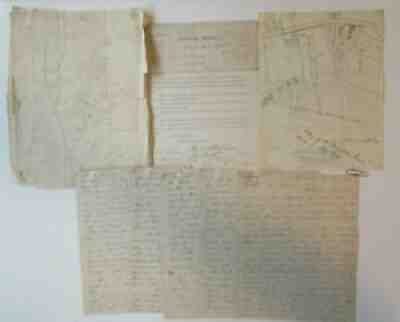
1893 Maps Civil War Battle Antietam Map Rufus Dawes Report Request & 1895 Letter
Click here for more information
CollectionHero
And then there is a five page handwritten letter dated 1895 to Dawes asking him about the battle as well, details on a map to be written. One handwritten map paperclipped to the five pages. There is also a printed map of Antietam by Olive Gould.
from CollectionHero
CollectionHero
790.00
USD
2025-11-20
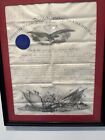
Brevit Commission To Brigadier General For Gettysburg For Thomas H Ruger
Click here for more information
CollectionHero
Brevit commission for the rank of Brigadier General for services at Gettysburg. The commission is dated March 2nd 1867. The ink is light but can be read. The signatures of President Johnson and secretary Stanton are facsimile. But Townsend’s signature is originalBelow is a brief Bio.Rugerwas appointed lieutenant colonel ofthe 3rdWisconsin Volunteer Infantry Regiment in June 1861, andpromoted to colonel on August 20.Ruger commanded his regiment in Maryland and the Shenandoah Valley campaigns.He participated in the Battle of Antietam, inwhich he was wounded while acting commander of a brigade in the 1stDivision, XII Corps Commissioned brigadier general ofvolunteers in November 1862, Ruger led his brigade of the XII Corps, Army of the Potomac, inthe Battle of Chancellorsville and commanded the division of Brig. Gen. Alpheus Williams temporarily at Gettysburg.[1] (Col. SilasColgrove led the brigade in that battle, participating in thedefense of Culp's Hill.) In thesummer of 1863, Ruger was in New York City, where he aided in suppressing draft riots.Rugerled a brigade of XX Corps in Maj.Gen. William T. Sherman's Atlanta Campaign until November 1864, and with a divisionof XXIII Corps took partin the campaign against General John B. Hood's army in Tennessee. He was appointed a brevet major general ofvolunteers, November 30, 1864, for services at the Battle of Franklin. Rugerorganized a division at Nashville and led hiscommand to North Carolina inJune 1865, and then had charge of the department of that state until June 1866.[2] He wasmustered out of his volunteer commission, accepting a regular army commissionas colonel, July 28, 1866, and on March 2, 1867, was brevetted brigadiergeneral regular army, for his services at Gettysburg Lateryears[edit]Rugerparticipated in Reconstruction asthe military governor of Georgia and inthe Freedmen's Bureau in Alabama in 1868. He was the superintendent of the United States MilitaryAcademy from 1871 to 1876. Other commands he held werethe Department of the South (1876–78),the Infantry and Cavalry School of Application (1885-86),the Department of Dakota (1886–91),the Military Division of thePacific (1891), the Department of California (1891–94),the Military Division of theMissouri (1894-95) and the Department of the East (1895–97).In 1887 Ruger led the army's expedition into the Big Horn Mountains duringthe Crow War. He retired, in 1897, with the rank of major generalin the Regular Army.Hewas a Veteran Companion of the Military Order of the Loyal Legion of the United States andan Honorary Companion of the Military Order of ForeignWars Hedied in Stamford, Connecticut, andis buried in West Point NationalCemetery [3]Fort Ruger at Diamond Head on Oahu isnamed in his honor. Professionally framed and ready to hang on your wall. Cool PieceIf you have any questions. Please don’t hesitate to ask. Shipping is flat 40 (if i over charge you by 5 or more dollars for Shipping. I will refund the difference). This includes insurance and signed delivery. Please note I will not ship to Post Office boxes or Charlottesville Virginia due to past issues. (Condition: Pre-Owned)
from CollectionHero
CollectionHero
699.00
USD
2025-11-20
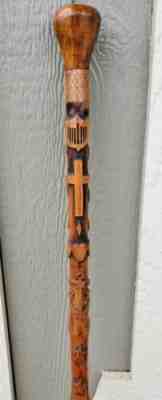
Civil War Carved Folk Art Walking Cane - Circa 1875 - Charles Teale
Click here for more information
CollectionHero
Charles W. Teale (1817-1895). These carving was to add whimsical character to the canes used my the Confederate and Union Soldiers with leg injuries from their service during the Civil War. It could take a couple months to produce a single cane with this detail.
from CollectionHero
CollectionHero
600.00
USD
2025-11-20
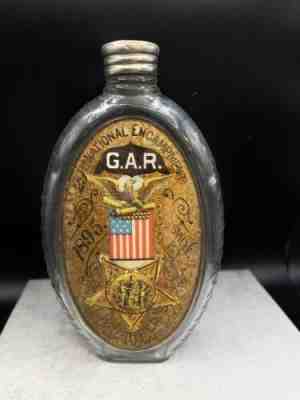
Grand Army of the Republic Louisville, Kentucky, 1895 Harperâ??s Whiskey G.A.R.
Click here for more information
CollectionHero
Find many great new & used options and get the best deals for Grand Army of the Republic Louisville, Kentucky, 1895 Harperâ??s Whiskey G.A.R. at the best online prices at eBay! Free shipping for many products!
from CollectionHero
CollectionHero
597.77
USD
2025-11-20
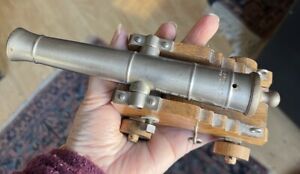
Vintage Dikar Spain .45 Cal Black Powder Miniature Civil War Signal Cannon Stee
Click here for more information
CollectionHero
Home About Us View all listings Contact Us Shipping Menu Categories Music, Instruments Jewelry: Antique Vintag?e MENS JEWELRY: CAMEOS Jewelry: 1940-1980's Vintage Jewelry: 1910 - 1939 Art Deco Jewelry: 1837-1910 Victorian Jewelry: 1895-1910 Art Nouveau JEWELRY: Necklaces, Pendants WATCHES & WATCH ACCESSORIES JEWELRY: Brooches & Pins JEWELRY: Earrings JEWELRY: Bracelets JEWELRY: Lockets JEWELRY: Charms & Bracelets JEWELRY: Sets JEWELRY: Rings JEWELRY: SILVER CHINA & PORCELAIN RELIGIOUS ITEMS ANTIQUES & COLLECTIBLES ART Pottery VANITY & SHAVING COLLECTIBLES GLASS SILVER DECORATIVE COLLECTIBLES ANTIQUE VINTAGE CLOTHING PURSES Toys, Dolls, Games SEASONAL LAMPS & LIGHTING FIXTURES Antique & Vintage Textiles MILITARIA FURNITURE, WOOD, Music Boxes CAMERA & ACCESSORIES BOOKS Mid-Century Moderne Other Store Newsletter Add our store to your Favorites to receive our email newsletters about new items & special promotions. Sign Up Vintage Dikar Spain .45 Cal Black Powder Miniature Civil War Signal Cannon Steel Wood Caisson 1950’s Product description Vintage 1950’s Dikar Spain .45 Cal Black Powder Miniature Signal Cannon Steel 4 Wood Wheels Carriage Caisson We are offering a vintage 1950’s replica miniature Civil War Navy cannon toy, measuring about 7.5” long altogether, 4.25” long at the base and a 7.25” barrel, and 3.25” wide. The barrel is steel, and is stamped “Dikar Spain 45 Cal/ Black Powder Only”. This piece is equipped with rings to thread rope through, and comes with an elevation block. This piece is the perfect addition to any collection. For signaling only. This piece is not meant to fire projectiles. It has not been tested, Sold as is. Excellent condition with no cracks. All pins and screws are still present. 1L6z #7 3L militaria dikar cannon miniature Payment Feedback Shipping Returns Payment Payment terms coming soon Feedback Feedback terms coming soon Shipping Shipping terms coming soon Returns Returns terms coming soon HomeAbout UsView all listingsContact UsShipping Copyright © 2018 EllisAntiques. All Rights Reserved. | eBay Store Design by OCDesignsOnline (Condition: Pre-Owned)
from CollectionHero
CollectionHero
549.99
USD
2025-11-20
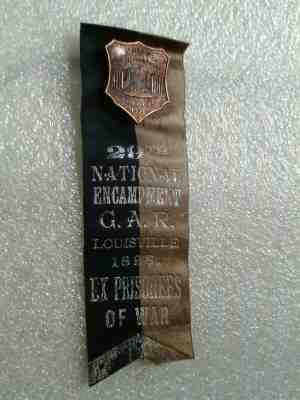
1895 LOUISVILLE KENTUCKY GAR CIVIL WAR VETERAN EX PRISONER OF WAR RIBBON & MEDAL
Click here for more information
CollectionHero
1895 LOUISVILLE KENTUCKY GAR CIVIL WAR VETERAN EX PRISONER OF WAR RIBBON & MEDAL - Sold on eBay Jun, 21st 2019 for $511.00
from CollectionHero
CollectionHero
511.00
USD
2025-11-20
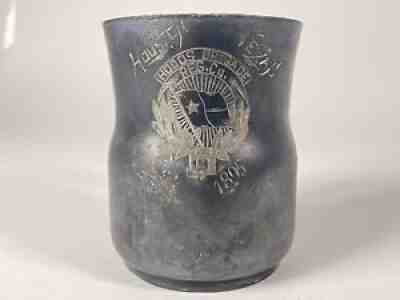
Hoods Brigade Regiment Company Houston Texas May 1895 Civil War Confederate Cup
Click here for more information
CollectionHero
Hoods Brigade Regiment Company Houston Texas May 1895 Civil War Veterans Cup. As found. Being sold as is as a historical, vintage collectible. Original confederate piece.
from CollectionHero
CollectionHero
499.99
USD
2025-11-20
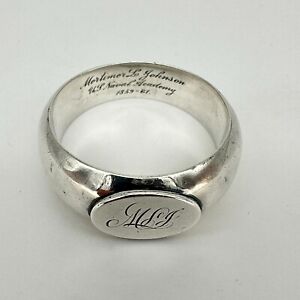
Mortimer L. Johnson Civil War Soldier US Navy Personal Silver Napkin Ring
Click here for more information
CollectionHero
eBay This listing is for a silver napkin ring featuring a cartouche on the front with initials MLJ and inscribed inside the ring is:Mortimer L. JohnsonU.S. Naval Academy1859 - 1861This is a fantastic and original piece of history commemorating the training of an individual, 17 years old upon appointment as a cadet, at the US Naval Academy. Mortimer L. Johnson would go on to serve in the Navy for 45 years through a storied and prestigious career, becoming the commander of many vessels and taking part in historic actions spanning the US Civil War to the Spanish American War. Please see a more detailed biography below.The piece measures 2-5/8" outer diameter and 5/8" at the thickest height. Fashioned from hollow silver, the piece is not hallmarked so it is unclear whether the piece is Coin or Sterling Silver, but is certainly silver none the less. Signs of age including minor dents to the outside of the ring. A testament to the likelihood it was carried and cherished by Mortimer during some period during his life.If you have any questions, please feel free to ask. Shipping will be free. Thank you!Mortimer Lawrence Johnson (1842-1913) - Naval officer, was born at Nahant, Mass.; son of Walter and Hannah (Pratt) Johnson; grandson of Joseph and Mary (Cox) Johnson, and a descendant of Lieut. Francis Cox, of the Revolutionary army. He was appointed naval Cadet from Massachusetts to the U.S. Naval academy, Nov. 29, 1859, and ordered into active service in May, 1861. On March 4, 1862, an armed launch from the frigate Wabash, including Midshipman Johnson, was positioned to protect a railroad bridge near Fernandina, Florida, during operations against that port. Commander P. Dayton, commanding Pawnee, reported that Johnson "pushed along the railroad with some of his men, and in the course of the day brought in two locomotives and three railroad cars."On April 11, 1862, Midshipman Johnson participated in a 100-man detail from the frigate Wabash that manned Battery Sigel during the attack and capture of Fort Pulaski, Ga. Commander C. R. P. Rodgers, commanding Wabash, commended Johnson and others for their participation in the attack. He was commissioned ensign, Sept. 16, 1862; promoted lieutenant, Feb. 22, 1864; and served on the Susquehanna, Sabine and Wabash in the South Atlantic squadron in all operations under Admirals Du Pont and Dahlgren from May, 1861, to August, 1864, when he was transferred to the steam frigate Colorado and took part in both attacks on Fort Fisher. On June 1, 1865, Johnson is listed as commanding the side-wheel steamer Estrella.Two weeks later, Admiral Thatcher informed Secretary of the Navy Gideon Welles that he had appointed his flag lieutenant M. L. Johnson, to command his new flagship, Estrella from January to September, 1865. After the civil war, in 1866, President Andrew Johnson nominated Johnson for promotion to Lieutenant Commander, effective July 25; commander, April 26, 1878; captain, May 9, 1893. He served on the U.S.S. Plymouth, European station, 1868-70; at the navy yard, Portsmouth, N.H., 1870-71; on the receiving-ship Sabine, 1873-74; the receiving ship Ohio at Charlestown, Mass., 1875; the Wabash, 1875-78; commanded the Ashuelot, Asiatic station, 1879-81; was on special dutyat Portsmouth Navy Yard from January to April 1882, then a torpedo instructor at Newport, Rhode Island from May to July 1882; stationed at the Charlestown navy yard, Boston, Mass., 1884-87; commanded the Monocacy, Asiatic station, 1889 91 cruising along the coasts of Japan, Korea and China, and docking in Japan during the winter months; was on waiting orders, 1892-93; He was promoted to Captain on May 9, 1893, and was briefly stationed at Portsmouth Navy Yard, until November, then commanded the screw frigate Franklin, which served as Norfolk's Receiving Ship, from April 1894 to July 1895. He commanded the cruiser Cincinnati, North Atlantic Station, from August 1895 to May 1897, followed by a short period in command of the cruiser San Francisco, European Station, until September, 1897. He was on leave of absence and waiting orders from October 1897 to March 1898, when he took command of the double-turreted monitor Miantonomoh in the North Atlantic squadron during the Spanish American war. After the war, Johnson was Captain of the Boston Navy Yard, from at least October 1898 to January 1901, where he was promoted to Rear Admiral on January 29, 1901. He was briefly Commandant of the Port Royal Naval Station. From September 1901, he was Commandant of the Boston Navy Yard, where he remained until placed on the Retired List on June 1, 1904.Mortimer Johnson was married twice. His first wife, Maria Elizabeth Stacey, daughter of Thomas and Sarah Maria Atkinson Stacey, was killed by an earthquake at Arica, Peru (now Chile), on August 13, 1868. He died February 14, 1913, in Portsmouth, New Hampshire.
from CollectionHero
CollectionHero
499.95
USD
2025-11-20
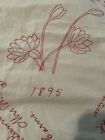
1895 WOMEN’S RELIEF CORP Civil War Red Work Quilt Signature Historical WRG US
Click here for more information
CollectionHero
This RedWork piece of history contains the date 1895. The Woman’s Relief Corps made these pieces as an aid to help Civil War families, widows, children snd veterans. Well known people would pay to have their name included on these pieces. The item would then be auctioned or raffled. There are MANY different historical names of the era. The name Belle Starr. appears on the handiwork piece, so she must’ve either paid to have her name included, or possibly donated her time, to the cause. The Women’s Relief Corp’s main objective was to help disabled veterans, war widows and orphans after the civil war. They later became involved in the women’s suffrage movement and helped get us the right to vote. Susan B Anthony and Harriet Tubman were members ** This item is a lightweight throw or spring sheet and is not quilted. It does have a sheet backing. Item measures 80” x 66”I found no holes, rips, tears or stains. The needlework of the flowers etc, are very well done. ——-I have other items listed, and can often combine shipping These are only my opinions as I am not an expert on anything. Please see photos for size and description I have other items ListedCame from estate saleI list a wide variety of items daily, so please visit often——— See the many other like items listedItems sold As Is, so be your own judgeSee photos for conditionI ship within two days of payment. Payment is expected immediately, the day of SaleNO INTERNATIONAL SHIPPING (Condition: Pre-Owned)
from CollectionHero
CollectionHero
495.00
USD
2025-11-20
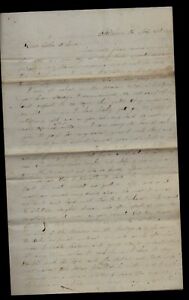
CONFEDERATE CIVIL WAR LETTER - 48th NC Infantry - Capture of Jefferson Davis !
Click here for more information
CollectionHero
eBay Civil War LetterWe could not find an image of Hege but here is one of John Young Shitle of Co. I, 48th North Carolina Infantry. He was mortally wounded at Sharpsburg.This remarkable Civil War letter was written by Constantine Alexander Hege (1843-1914), the son of Solomon Hege (1813-1875) and Catharine Guenther (1813-1874) of Davidson County, North Carolina. Constantine was raised as a Moravian and was naturally opposed to the war, but he was never the less obliged to enlist in the summer of 1862 in Co. H, 48th North Carolina Infantry. He served for 14 months during which time he was captured at the Battle of Bristoe Station on 14 October 1863 and was confined in the Old Capitol Prison in Washington. While there he was visited by some North Carolina Moravians working in the capitol, and under their guidance, Hege decided to take the oath of allegiance to the United States. After his release, he went to Bethlehem, Pa., where he found employment in the iron works.“In August 1865 Hege returned to North Carolina, but a few months later entered the Bryant & Stratton Commercial College in Philadelphia where, upon completing the course, he was employed by a mercantile firm. In the spring of 1867 he opened a small country store at Friedburg, N.C. A few years later he moved to Salem to start a small foundry. After acquiring a steam engine his business expanded, and in 1877 he obtained a patent for an improved set of works for circular sawmills. He then began manufacturing sawmills and wood-working machinery which he also invented. The sawmills produced at Hege’s Salem Iron Works were sold throughout the United States and in several foreign countries. The first sawmill in Alaska was one he gave to the Moravian mission there.The Salem Iron Works were owned and operated by Constantine Hege, who began the business in 1867 from a small shed in Salem. By 1882 the business had grown and his engines, wood planers, saw mills, and woodworking machinery were in great demand. He erected this three-story building on Salt Street at a cost of $30,000. A group of boys sit on the hill in the foreground viewing the impressive industrial complex. [Digital Forsyth]Hege was married in 1870 to Frances Mary Spaugh from an area near Salem, and they were the parents of Walter Julius, Ella Florence, and Rose Estelle. Following the death of his first wife, Hege married Martha Caroline Spaugh in 1895.” [William S. Powell, 1988]TRANSCRIPTIONBethlehem PennsylvaniaMay 21st 1865Dear folks at home,You will please excuse my writing this letter on Sunday as Mr. J. Fisher expects to start for Salem, N. C. tomorrow morning and I wish to send this with him. I wrote two letters a few days ago to send by Felix Lernback who is also going to Salem.I am at school in the Moravian College as I suppose you know already. I commenced the 26th day of April and expect to continue there until August unless you are not willing. I have hardly got in the way of studying yet and as you see, my hand is not very well trained to the pen either. I am sorry to have to ask you to pay for my schooling as I wish Mary and Julius to go to school several years yet, but as you so kindly desired me to go to school and by the advice of one of my best friends or almost a father to me in directing me aright and helping me in many ways (Rev H. A. Shultz) and who so kindly offered to pay my expenses so that I thought it would be wrong on my part to not accept so good an offer and as it was so much my desire also. So now I am at school and board with Rev. H. A. Brickenstein who married Bro. Shultze’s daughter, Susan, who often speaks of you, dear mother, and it was on your account that they kindly offered to board me while at school.Rev. Mr. Brickenstein is one of the teachers in the College, and he seems to take especial interest in me as he often hears my private lessons and gives me any instruction at any time when I ask him. I have to pay $4 per week for board and the tuition and books will cost about $20 dollars for those three months and I will require some more clothing before the end of the session, which will cause my school bill, including board, tuition and clothing, &c., to be about $90 or $100. And then I have not yet paid Br. Hagen those $50 dollars received from him while at Washington Everything is very high and wages were comparatively small so that I could not make more then enough to pay my board and supply myself with plenty of warm clothing for the cold winter as I prized my health and comfort more than money. You will perhaps be surprised and may perhaps scold me for the way I have acted since I have been away from home, but I generally did what I thought to be best & right, and I could have made more money if I had remained at the Rolling Mill but I thought that I could not stand the heat very much longer without injuring [myself] and as I often said, I prize health more than gold, so I thought best, by the advice of friends to try to get a better or at least a more healthy job of work, which I very soon did at the barrel factory as you already know, and I worked there 8 months at $1.75 per day and frequently worked overtime and you would readily suppose I ought to have saved some money, but I had to buy so many things that I could hardly make my income meet my expenses during the winter. And so I had to pay $45 dollars for a summer suit which consisted of coat, vest & pants. You can imagine where my money went.I have kept a diary ever since I left home and a memorandum of my expenses since I have been here so that I can easily see for what I spent my money. Mr. Fisher will tell you all about my circumstances better than I can write them. I must write faster so that I can finish this before Sunday as I have to attend as a teacher at 9:30 A. M. but not as competent teacher as I would like to be. I have about one dozen boys in my class whose ages range from 9 to 17 years of age. We have a small school house to keep the Sunday school in in West Bethlehem and there are about 100 scholars so we have only about one fourth room enough for the children to be seated comfortably. Mr. Eugene Shaffer, one of the students, is the superintendent and Theodore Rights and I and four of the other students are the male teachers and then there are about as many female teachers.I attend preaching at 10:30 A.M. in the Moravian Church Bible Class at 1:30 P. M. kept by Br. Sepweinit for the benefit of the young men of town and at 7:30 P. M. at preaching again in the Moravian Church.Edward G. Mock arrived here last Thursday. He was prisoner for nearly 16 months during which time he had the small pox and several other diseases at different times of which he has very fortunately recovered and has now more of a healthy appearance than ever. He is at work here in Bethlehem. I procured a good place for him to board at and helped him along as best I could. I will herein send you one of my photographs which I had taken in my working style. I will send you a better one soon as I have more taken. Do you expect to furnish your new storehouse near Sheltons with goods? It is thought that the South will be full of Yankee merchants in a few years which will be a great help to the South. Slavery is what has kept the South down so long.“How does Sam like his freedom? and what and how do the Negroes do? Do they work for their old masters? I am glad that the curse of slavery has at last been brought to a close….Old Jeff, that brave President of the Great Confederacy showed his bravery, dressing up in his wife’s dress and tried to carry the last remains of the C. S. A. in a band box—brave fellow. He is done issuing orders to hunt deserters and sentencing poor innocent men to be shot. He will now take his turn, and we’ll hang Jeff Davis on a sour apple tree as go marching home. I would like to see his neck stretched ”— C. A. Hege, 21 May 1865Tell Cousin Nannie Hege and Prof. G. W. Hege to write to me unless they have disowned me as their cousin on the account of my coming North. I would be very glad to receive letters from any of my old friends, acquaintances, school mates. Was you robbed of any property or had any horse stolen? How does Sam like his freedom? and what and how do the Negroes do? Do they work for their old masters? I am glad that the curse of slavery has at last been brought to a close.Old Jeff, that brave President of the Great Confederacy showed his bravery, dressing up in his wife’s dress and tried to carry the last remains of the C. S. A. in a band box—brave fellow. He is done issuing orders to hunt deserters and sentencing poor innocent men to be shot. He will now take his turn, and we’ll hang Jeff Davis on a sour apple tree as go marching home. I would like to see his neck stretched.So I must close. Please excuse nonsense, haste, bad writing, &c., as I am in a hurry and have not time to look over the letter to correct errors, &c.Don’t forget an erring son far away from home, but yet among friends. Yours with much love, — C. A. HegeP. S. Please write a long, long letter in return.TERMS: Postage combined for multiple purchases. Please wait for me to send the invoice, otherwise you will pay a higher rate.We are members of the American Philatelic Society, the U.S. Philatelic Classics Society, the Manuscript Society and the Civil War Philatelic Society.We only sell genuine, original letters (no copies or reproductions). Some of our letters have been transcribed and nicely presented for future genealogists and history buffs on the Spared & Shared blog.We have been selling on eBay since 1998. BID WITH CONFIDENCE !
from CollectionHero
CollectionHero
484.90
USD
2025-11-20
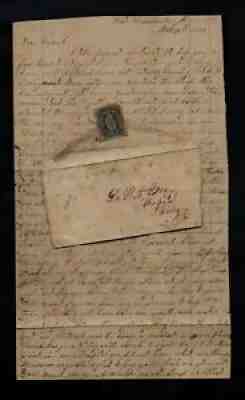
CONFEDERATE CIVIL WAR LETTER - 52nd NC Infantry - Freed Slave Buys his Wife !
Click here for more information
CollectionHero
This remarkable Confederate Civil War folded letter (franked with a CSA stamp) was written by Mary Evelyn (Wheeler) Cox (1841-1936), the wife of Peyton Alexander Cox (1827-1895) who served in Co. K, 52nd North Carolina Infantry but who was detailed as a nurse at the Wilson Confederate Hospital in Wilson, North Carolina, when this letter was penned in November 1864.
from CollectionHero
CollectionHero
456.00
USD
2025-11-20
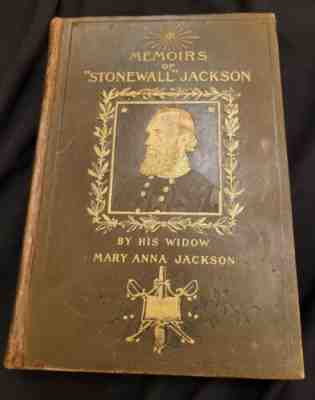
Stonewall Jackson, Memoirs by widow Mary Anna Jackson 1895, First Edition, fine!
Click here for more information
CollectionHero
Find many great new & used options and get the best deals for Stonewall Jackson, Memoirs by widow Mary Anna Jackson 1895, First Edition, fine! at the best online prices at eBay! Free shipping for many products!
from CollectionHero
CollectionHero
431.00
USD
2025-11-20
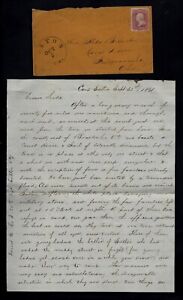
CIVIL WAR LETTER - 30th Ohio Infantry - Sutton West Virginia Flooded & Deserted!
Click here for more information
CollectionHero
eBay Civil War LetterGeorge Henry Hildt, 30th OVI (photo courtesy of Vicki Hildt Marjerrison - by permission of Spared & Shared.)This Civil War soldier letter was written by George Henry Hildt (1835-1914), the son of John Hildt (1807-1885) and Maria Elizabeth Gloninger (1812-1892) of Dover, Tuscarawas county, Ohio. George briefly homesteaded in Kansas in 1857 (see diary extract) and worked in St. Louis, but returned to Ohio in 1859.He served in the 3-month 16th Ohio Infantry, enlisting as Private in Co. F and being promoted 2nd Lieutenant on 6 June. He mustered out with the company on 18 August. He then helped recruit another Company of volunteers which became Co. I of the new 30th Ohio Volunteer Infantry (OVI). He mustered in as Captain on 22 August 22, 1861. He was promoted to Major of the regiment on 28 January 1862.George took command of his regiment during the Battle of Antietam as the senior officer after Lieut. Colonel Jones was captured. Colonel Ewing had previously been promoted to brigade command. After Antietam, the regiment headed south and west in the later part of 1862 and early ’63, seeing service in Kentucky, Arkansas, and three month stretch in Louisiana to March 1863. He was appointed Lieutenant Colonel on 18 April 1863 at Walnut Hills, Mississippi, then in operations around and in the siege of Vicksburg. He was wounded in the left hip there on 22 May 1863. The regiment was at Chattanooga and Knoxville in early 1864, and on the Atlanta Campaign May to September. He resigned on 22 September 1864.After the war, George returned to Canal Dover (now Dover), OH and was a pension agent, once clerk in the office of Secretary of State of Ohio, and active in the Loyal Legion and Army of the Tennessee veteran’s groups. He also held the position of Commander of the Ricksecker Post (No. 469) of the Grand Army of the Republic. [Source: Antietam on the Web]George wrote the letter to his cousin Alida Braucher (1843-1897), the daughter of Joseph Braucher (1810-1884) and Juliana Antoinette Hawley (1822-1895) of Canal Dover, Tuscarawas county, Ohio TranscriptionAddressed to Miss Alida Braucher, Canal Dover, Tuscarawas County, OhioCamp SuttonSeptember 30, 1861Cousin Lide,After a long weary march of seventy-five miles over mountains and through much mud, we arrived at this point just one week from the time we started from home. It is the county seat of Braxton County, Virginia and boasts a Court House and Jail of tolerable dimensions but the town is no place at all; only one street and that a short one, with mud knee deep everywhere. And with the exception of four or five families entirely deserted. 1We have just been visited by a tremendous flood. Elk river turned out of its banks and visited Sutton, overflowing the whole place damaging our military stores, and forcing the few families left out at 10 o’clock at night. 2 A part of them took refuge in camp & we gave them the officer’s quarters—the best we could do. My tent at one time contained seventeen of all ages, sexes and colors. Three of them were young ladies—the belles of Sutton—who had waded the muddy street in fright (for young ladies get scared once in awhile you know) and made their way to camp. Their manners were very easy and notwithstanding the disagreeable situation in which they were placed, took things as they found them and were contented.They were wishing we would allow them to come to camp before now but did not expect they should come under such circumstances. They do not live in town when at home, but came here from the country when Col. Smith had command, & remained some time. When they wishes to go home, Rosecrans was here and he had them retained because they knew too much of our forces to go. Since then, Lt. Col. Jones of the 30th Regt. (our man) has command and he holds them for the same reason, & when they will be allowed to go home, I do not know.We have now in prison three ladies who have been guilty of aiding the enemy. We had more but on examination released them. I pity them. They appear so irritable and troublesome, but withal they defiantly refuse to take the oath and of course are not loyal.To this time, I have not heard from home nor seen a newspaper & feel really as if I was out of this world. We expect a mail tonight and I live in hopes that I may receive something in the news line & know something about what is going on in the United States. I suppose your camp is flourishing & I know it must be a novelty to the rest of you to see military duty performed in a peaceful country, but here in active service it is different and necessary. Camp life in the school, active service the reality.Yours truly, — George H. HildtDirect to Co. I, 30th Regt., Sutton, Virginia1 This description of Sutton as it appeared in September 1861 certainly leaves us with the impression that aside from the court house and jail, there was very little “town” to speak of. Much is made of the burning of the town on 29 December 1861 by rebel guerrillas and the commissary stores that were there. See “Burning of Sutton.”2 A History of Braxton County by John Davison Sutton reports that the flood of 1861 was one of the worst in county history. The water “ran down the main street of the town and was “belly-deep to a horse.”TERMS: Postage combined for multiple purchases. Please wait for me to send the invoice, otherwise you will pay a higher rate.We are members of the American Philatelic Society, the U.S. Philatelic Classics Society, the Manuscript Society and the Civil War Philatelic Society.We only sell genuine, original letters (no copies or reproductions). Some of our letters have been transcribed and nicely presented for future genealogists and history buffs on the Spared & Shared blog.We have been selling on eBay since 1998. BID WITH CONFIDENCE !
from CollectionHero
CollectionHero
406.50
USD
2025-11-20
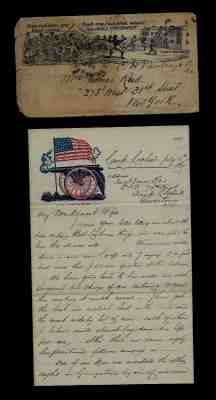
CIVIL WAR LETTER - 79th New York Infantry INCREDIBLE CONTENT & Slave Envelope !
Click here for more information
CollectionHero
CIVIL WAR LETTERThis remarkable Civil War letter was written by Sgt. James Reid who enlisted as a private in Co. B, 79th New York Infantry (aka, the “Cameron Highlanders”) in May 1861 to serve three years. He rose in the ranks from private to first sergeant before being commissioned a 2d Lieutenant of Co. H, and then a 1st Lieutenant of Co. I. He resigned his commission on 28 April 1863 at Lebanon, Kentucky.Reid was born in England in 1835. He was married to a woman named Lizzie, born 1843 [died 1895, age 49?], in Ireland. In 1863, Reid is found in the New York City Directory at the addre
from CollectionHero
CollectionHero
401.92
USD
2025-11-20
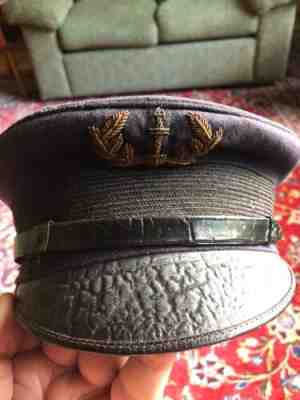
U.S. LIGHTHOUSE SERVICE KEEPERS DRESS HAT VERY USED 1895-1920 VERY USED
Click here for more information
CollectionHero
This is a very old US Lighthouse keepers hat from 1895-1920
from CollectionHero
CollectionHero
400.00
USD
2025-11-20
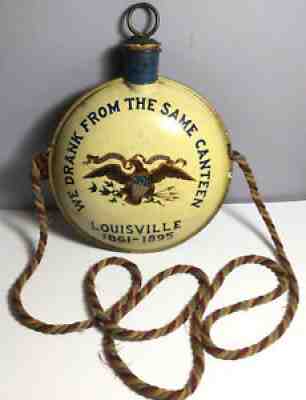
ANTIQUE CIVIL WAR-GAR WE DRANK FROM THE SAME CANTEEN LOUISVILLE 1861-1895 EAGLE
Click here for more information
CollectionHero
I have for auction an original ANTIQUE CIVIL WAR-GAR WE DRANK FROM THE SAME CANTEEN LOUISVILLE 1861-1895 EAGLE. Condition is "Used". This measures 5 inches in diameter and is in very good condition. The rope on the canteen is approximately 41 inches. Please view photos before bidding. Thank you for looking and good luck. And please view my other items for sale. Shipped with USPS Priority Mail.
from CollectionHero
CollectionHero
377.51
USD
2025-11-20
![1866 Ely Parker ANS civil war general [FP.157]](https://collectionhero.s3.us-east-2.amazonaws.com/civilwar/608781e43a8e4.jpg)
1866 Ely Parker ANS civil war general [FP.157]
Click here for more information
CollectionHero
1866 autogrpah note or short letter signed by Ely Samuel Parker (1828-1895), who served in the army and reached the rank of brevet brigadier general. Letter is apparently as Grant's secretary, writing to General W.E. Strong and refers to Gen.Rawlins and Gen. Sherman, asking about an invitation to Admiral Porter.
from CollectionHero
CollectionHero
373.97
USD
2025-11-20
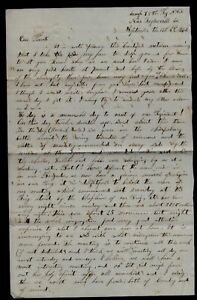
CONFEDERATE CIVIL WAR LETTER - 48th NC Infantry - Screams Dying BATTLE ANTIETAM!
Click here for more information
CollectionHero
eBay Civil War LetterWe could not find an image of Hege but here is one of John Young Shitle of Co. I, 48th North Carolina Infantry. He was mortally wounded at Sharpsburg.This Confederate Civil War letter was written by Constantine Alexander Hege (1843-1914), the son of Solomon Hege (1813-1875) and Catharine Guenther (1813-1874) of Davidson County, North Carolina. Constantine was raised as a Moravian and was naturally opposed to the war, but he was never the less obliged to enlist in the summer of 1862 in Co. H, 48th North Carolina Infantry. He served for 14 months during which time he was captured at the Battle of Bristoe Station on 14 October 1863 and was confined in the Old Capitol Prison in Washington. While there he was visited by some North Carolina Moravians working in the capitol, and under their guidance, Hege decided to take the oath of allegiance to the United States. After his release, he went to Bethlehem, Pa., where he found employment in the iron works.“In August 1865 Hege returned to North Carolina, but a few months later entered the Bryant & Stratton Commercial College in Philadelphia where, upon completing the course, he was employed by a mercantile firm. In the spring of 1867 he opened a small country store at Friedburg, N.C. A few years later he moved to Salem to start a small foundry. After acquiring a steam engine his business expanded, and in 1877 he obtained a patent for an improved set of works for circular sawmills. He then began manufacturing sawmills and wood-working machinery which he also invented. The sawmills produced at Hege’s Salem Iron Works were sold throughout the United States and in several foreign countries. The first sawmill in Alaska was one he gave to the Moravian mission there.The Salem Iron Works were owned and operated by Constantine Hege, who began the business in 1867 from a small shed in Salem. By 1882 the business had grown and his engines, wood planers, saw mills, and woodworking machinery were in great demand. He erected this three-story building on Salt Street at a cost of $30,000. A group of boys sit on the hill in the foreground viewing the impressive industrial complex. [Digital Forsyth]Hege was married in 1870 to Frances Mary Spaugh from an area near Salem, and they were the parents of Walter Julius, Ella Florence, and Rose Estelle. Following the death of his first wife, Hege married Martha Caroline Spaugh in 1895.” [William S. Powell, 48th Regiment N. C. TroopsNear Taylorsville, the 17th, 1863Dear Parents,It is with pleasure this beautiful autumn morning that I take my pen to drop you a few lines to let you know where we are and how I am. I am in very good health at present and hope by the blessing of the Almighty these few lines may find you all likewise well. I have not had any letter from you since last Monday and I thought I would write anyhow. I answered your letter the same day I got it. I always try to answer my letters as soon as I can.“Today is a memorable day to most of our regiment! On this day twelve months ago, and about this time in the day (11 o’clock A.M.), we were in the Sharpsburg battle amid the roaring thunder of cannons and the clatter of musketry surrounded on every side by the screams of the dying and wounded soldiers while the shells, bullets, and balls were whizzing by us at a shocking rate.”— Constantine A. Hege, Co. H, 48th North Carolina, 17 Sept. 1863Today is a memorable day to most of our regiment! On this day twelve months ago, and about this time in the day (11 o’clock A.M.), we were in the Sharpsburg battle amid the roaring thunder of cannons and the clatter of musketry surrounded on every side by the screams of the dying and wounded soldiers while the shells, bullets, and balls were whizzing by us at a shocking rate.But O! how different the scene now is in our brigade. We now have a glorious revival of religion in our brigade. It is delightful to behold the scene of our meeting which commenced last Sunday at the brigade stand by the chaplains of our brigade. It has been every night since Sunday and there are about 2000 soldiers every night. There were about 25 mourners last night and the whole congregation paid very good to what I almost ever saw at home. It is encouraging to see with what willingness the mourners come forward. The meeting is to continue all this week (if not disturbed) and I think we will have meeting all day on next Saturday and Sunday. I believe we will have a most interesting meeting, and oh! that God might pour out his holy spirit upon all mankind and I verily then we would soon have peace, both of country and of mind.We have very nice weather now—only there are slight showers which cause the ground to be very damp and uncomfortable for meeting out doors. There is not much news in camp now. We have been faring very well lately—as well as soldiers can expect. Our rations are changed. Sometimes we draw flour and bacon, some days cornmeal and beef or mutton other days, and sometimes some potatoes or something new.David Zimerman got a furlough yesterday to go home 10 days. There has been some fighting about Culpeper Court House a few days ago. We have heard that the 21st N. C. Regiment is at Salem, North Carolina. Is it so? Are there any revivals close about home? We can hear of many revivals both at home and in the army. I am very much pleased with the religious movements and I believe it is the commencement of better times. Will there be any protracted meeting this fall? Is the Sunday school still kept up as usual? What are the times in general about home?So I must close for the present by asking you to please write soon adn often and remember me in your prayers and i hope by the blessing of the Almighty that I will be permitted to return home again alive, safe and well in peace and safety.Remember me your affectionate son, — C. A. HegeTERMS: Postage combined for multiple purchases. Please wait for me to send the invoice, otherwise you will pay a higher rate.We are members of the American Philatelic Society, the U.S. Philatelic Classics Society, the Manuscript Society and the Civil War Philatelic Society.We only sell genuine, original letters (no copies or reproductions). Some of our letters have been transcribed and nicely presented for future genealogists and history buffs on the Spared & Shared blog.We have been selling on eBay since 1998. BID WITH CONFIDENCE !
from CollectionHero
CollectionHero
367.33
USD
2025-11-20